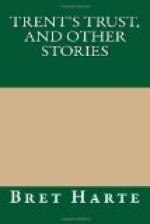“I picked you up just outside the door,” replied the housekeeper.
“Then they did not see me?” said Mrs. MacGlowrie.
“Who’s they?” responded the housekeeper with more directness than grammatical accuracy.
“The people in the dining room. I was just opening the door—and I felt this coming on—and—I reckon I had just sense enough to shut the door again before I went off.”
“Then that accounts for what Jim Slocum said,” uttered Miss Morvin triumphantly. “He was in the dining room talkin’ with the new preacher, when he allowed he heard the door open and shut behind him. Then he heard a kind of slump outside and opened the door again just to find you lyin’ there, and to rush off and get me. And that’s why he was so mad at the preacher!—for he says he just skurried away without offerin’ to help. He allows the preacher may be a pow’ful exhorter—but he ain’t worth much at ‘works.’”
“Some men can’t bear to be around when a woman’s up to that sort of foolishness,” said the widow, with a faint attempt at a smile, but a return of her paleness.
“Hadn’t you better lie down again?” said the doctor solicitously.
“I’m all right now,” returned Mrs. MacGlowrie, struggling to her feet; “Morvin will look after me till the shakiness goes. But it was mighty touching and neighborly to come in, Doctor,” she continued, succeeding at last in bringing up a faint but adorable smile, which stirred Blair’s pulses. “If I were my own dog—you couldn’t have treated me better!”
With no further excuse for staying longer, Blair was obliged to depart—yet reluctantly, both as lover and physician. He was by no means satisfied with her condition. He called to inquire the next day—but she was engaged and sent word to say she was “better.”
In the excitement attending the advent of the new preacher the slight illness of the charming widow was forgotten. He had taken the settlement by storm. His first sermon at Laurel Spring exceeded even the extravagant reputation that had preceded him. Known as the “Inspired Cowboy,” a common unlettered frontiersman, he was said to have developed wonderful powers of exhortatory eloquence among the Indians, and scarcely less savage border communities where he had lived, half outcast, half missionary. He had just come up from the Southern agricultural districts, where he had been, despite his rude antecedents, singularly effective with women and young people. The moody dyspeptics and lazy rustics of Laurel Spring were stirred as with a new patent medicine. Dr. Blair went to the first “revival” meeting. Without undervaluing the man’s influence, he was instinctively repelled by his appearance and methods. The young physician’s trained powers of observation not only saw an overwrought emotionalism in the speaker’s eloquence, but detected the ring of insincerity in his more lucid speech and acts. Nevertheless, the hysteria of the preacher was communicated to the congregation,




